
Heavenly Sword and Dragon Slaying Sabre
4 pessoas acharam esta resenha útil
A weakness of this story is its main character. Zhang Wuji had no real character development or internal struggles. He was a good guy at the start, a good guy in the middle, and still a good guy at the end. His main function was a tour guide who takes us viewers on a journey through the colorful world of wulin. You don’t need a very talented actor for that, just one who's likeable and earnest. He has to convince viewers that he has what it takes to make four women fall in love with him without even trying. As the hero, Zeng Shunxi was bland and a total miscast. He was so boring that I didn't care which girl he ended up with.
The biggest success here was the casting of Lin Yushen as Yang Xiao. This portrayal was iconic. He had just the right mix of brooding, arrogance, and tragic. The actor deserved to lead his own series. No more adaptations, they should just write a story just for him.
The show also boasted some of the best-looking cast, even down to the minor characters (to those who forgot who Yu Lianzhu was, you’ll remember him after watching this version). Most were solid in their acting, if not a little exaggerated at times, but I blame that on the directing.
Visually, the show got most of it right. The costumes were simple but classy in the spirit of hanfu, nothing outlandish or garish. Even the girls’ hair ornaments were elegant and tastefully done. The cinematography was breath taking, especially the shots of Wudang and Fire & Ice Island. The fight scenes were grand, and it was a good choice to keep the CGIs to a minimum. While I like the Matrix-esque slow motion, it was overdone here and made some scenes very draggy and tiring to watch.
Overall, not a bad series to check out if you’re a Jin Yong fan.
Esta resenha foi útil para você?
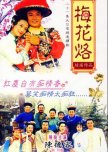
Love, as portrayed here, was unreasonable at best and dysfunctional at worst. Our one and only couple, Hao Chen and Yin Shuang, loved each other madly and obsessively. They acted like it’s the end of the world when he had to marry the Princess, never mind that arranged marriage and second wife were both acceptable practices of the time. While Hao Chen had no feelings for the Princess, he should at least treat her with the care and kindness any wife would expect. Instead, he insisted on keeping his love for Yin Shuang “pure.” His stubbornness made life a needless hell for all parties involved.
Steve Ma and Vivian Chen made a striking couple as the intense Hao Chen and the weepy Yin Shuang. Both overacted to the hilt. Lu Wen was better in her role her as the Princess, albeit with some crazy Chinese opera-style makeup. I felt sorry for the Princess more than anyone else. She was the only one who didn’t have much of a choice or a chance at real happiness. Her frustration at being in a helpless, loveless marriage brought out the worst in her. She came across as a sympathetic person instead of a cartoon villainess. At the end of the day, she deserved a better guy than Hao Chen. We all do.
I do like the soundtrack and overall aesthetic of series. Romance junkies might like the fact that the male lead never wavered in his devotion to the female lead. Other than that, there’s not much else to love about a drama that’s all about love.
Esta resenha foi útil para você?
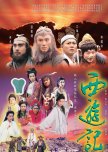
The novel is a classic for a reason, but it does have its drawbacks. The characters are personification of abstracts and concepts. They are largely symbolic with very little character development. The scriptwriters remedy that by adding more details and changes to build up relationships, backstories, and yes, even romance. They succeed in making Sun Wu Kong and company more “human” and relatable to us viewers.
The MVPs here are Dicky Cheung and Wayne Lai. This may be Dicky’s most iconic and memorable role ever. His take on Sun Wu Kong is a little modern, but uniquely “Dicky” with signature stances, hand signs, and a “Yo!” punchline. He has such bright, mischievous eyes and the right level of energy and nimbleness. Most of all, he can act and knows not to overact.
Wayne Lai is an absolute treasure. There’s no one quite like him, a versatile actor who can do drama, comedy, and farce all in a one scene. He plays a Zhu Ba Jie that’s selfish and manipulative, but also a hopeless romantic. He makes this widely hated character easy to like, even endearing.
Dicky, Wayne, and Evergreen Mak are a comedy dream team, with Kong Wah as their coach/straight man. Each of their routine is like a well-choreographed dance that will leave you grinning if not choking on your own laughter. Kong Wah as San Zang is more than adequate, even if he doesn’t physically look the part. I’m glad they change the storyline to make him not so helpless. He saves the day more than once, showing his students that fighting is not always the solution. This is how the writers pay tribute to Buddhist tenets, although it’s obvious that this show is not really about Buddhism.
The biggest issue with the writing is the lack of continuity. There are plot holes so big you could fit a giant stone monkey through them. How can a man die and then, in a few years, be reborn as a 1000-years-old demon? It's sloppy and annoying, but not bad enough to ruin the fun.
The show does have some fun “Easter eggs.” Watch for when San Zang searches for Kuanyin and encounters a fairy with a harp. That beautiful song she’s playing is the theme from “Reincarnated Princess,” an origin story of Kuanyin starring Angie Chiu. It takes you back to the golden days of TVB. They really don’t make series like these anymore.
Esta resenha foi útil para você?

Esta resenha pode conter spoilers
This was not a groundbreaking series by any means, but it had heart. You just have to get past all the clichés and stereotypes. It’s not easy, because there was a lot of those. There was the usual cancer, amnesia, and blindness clichés. There was your stereotypical CEO male lead who was trying much too hard to look cool. There was your stereotypical crazy stepfamily with an evil plan so dumb yet no one saw through it. Then there was your stereotypical selfless admirer who went above and beyond what’s humanly reasonable to ensure our heroine’s happiness.
What kept this series grounded was our heroine herself. Choi Ji Woo was so natural that it didn’t feel like she was acting at all, like she was just being herself. It made you wonder if she was just as kind and warm in real life. Her innate goodness was actually shown, not preached, to the viewers. It was easy to see why two men were so crazy about her, and it was not because she’s the female lead.
Kwon Sang Woo was incredible in the sad scenes. He was so immersed in his character that you will feel with him and weep along with him. Shin Huyn Yoon was also good in that he made an unbelievably nice Tae Hwa felt like a real person, and not an idealization. Kim Tae Hee was beautiful, but weirdly cartoonish in her portrayal of the wicked Yuri. The kids who played the young Jung Suh and Song Joo were perfectly cast. They matched the mannerism and feel of their older counterparts, so you have that nice continuity and emotional connection from the very start of the story.
The pacing was slow, as was expected of most melodrama. I slogged through it hoping to see a happy ending. That didn’t quite happen, but it was still beautiful and made sense in the overall theme of the story. Many years later it still made me cry.
Esta resenha foi útil para você?

The most memorable thing about the series is the art direction, which is highly stylized and simply stunning. The writers take great care in developing each character and creating the bleak yet beautiful world of Gong Men, a powerful family with many secrets, supposedly the last bastion against the ultra evil organization of Wu Feng. The worldbuilding is impressive, until it all falls apart like a pillar of sand in the finale.
The finale feels like it’s written by someone else entirely – someone who doesn’t bother to read the early chapters. Like a video game, characters are buffed and nerfed at random. Some of them are so OOC it will make your head spin. Then we have “The Dumbest Plan Ever,” hyped up by the so-called brains of Gong Men. The plan gives away strategic secrets, leading to the deaths of longtime allies and the wipeout of the Gong’s elite guards. After all that, they still can't touch Wu Feng's upper management, but viewers are told it's a victory and that the Gongs are brilliant strategists. At this point I can’t take the show seriously anymore.
The one saving grace is the supporting cast, which is one of the best ensemble cast I've seen in a while. The actors have such rapport that I wonder if they’re all close friends in real life. Cheng Lei and Lu Yu Xiao are smoldering with a kind of sexual tension you don't often see in C-drama. The leads Zhang Ling He and Esther Yu aren’t bad. They have chemistry with everyone, except each other.
This is a show that desperately wants to be taken seriously, but has not done enough to earn it. It’s better than mediocre, even entertaining in a shallow sort of way. You'll enjoy it more if you leave logic at the door.
Esta resenha foi útil para você?
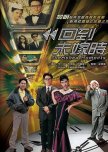
Esta resenha pode conter spoilers
Do watch this for Leon Lai and Kathy Chow. He was endearing in a dorky sort of way. She was sweet yet cheeky. They were cute when they flirted. They were even cuter when they fought. These two looked so comfortable together that I actually wondered if they were a real-life couple. Their chemistry alone made this series worth watching, at least for the first half.The second half of the series descended into hell as the writers contrived all sorts of ridiculous ways to keep the lovebirds apart. First, there was a stupid misunderstanding that could’ve been easily resolved through simple communication. Then Leon's character underwent an abrupt personality change, for no reason whatsoever. Finally, there was that sci-fi arc that felt like an entirely different drama altogether. The writers kept writing themselves deeper and deeper into a corner. The only way for them to get out of this mess was to do a hard reboot of the storyline. Yes, they erased nearly all of the plot as something that never happened. My only consolation was that Leon and Kathy got their happy ever after.
Esta resenha foi útil para você?

There's nothing good to say about the directing. It's like the cast were told to "do whatever, just don't wrinkle your costumes or mess up your jewelry." Be like a mannequin, basically. This type of "formal" acting might be ok in an ancient drama, but it was all wrong in a modern setting. The only actor who wasn't stiff was Nie Yuan, probably because he didn't have many nice outfits to show off.
Since the actors weren't allowed to act, they were given long-winded dialogues to explain their actions and thought process. The show very quickly became preachy and boring. The writing went from bad to atrocious. In the end, our intrepid heroines perservered thanks to dumb luck and even dumber villains.
I love the OST, from Zhou Shen's majestic opening theme to Han Geng's gentle crooning in the closing sequence. You're better off downloading the songs instead of watching the series.
Esta resenha foi útil para você?
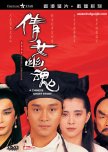
This was the age before CGIs, so the production team got very, very creative. Watch for the tree demon and underworld battle sequences. These scenes were designed not just to wow, but to look as realistic as possible. This was exactly the kind of special effects that can withstand the test of time.
The acting was good all around. Leslie Cheung was, as always, a natural. Next to him, Joey Wong seemed to be trying a little too hard, but she was beautiful nonetheless. The love story was much too rushed and shallow for me. The comedic scenes were pure genius and more than made up for it. That outrageous Taoist rap had me laughing so hard I nearly fell off my chair.
You can't talk about this movie without mentioning Leslie's rendition of the theme song. There will never be anything quite like it. And there will never be anyone quite like Leslie Cheung.
Esta resenha foi útil para você?

Interesting characters? Hardly. Ji Bai is a super cop whose only weakness is that he works too hard. This man is practically perfect, leaving no room for character growth. As for Xu Xu, we know nothing about her background or what makes her tick. She’s supposed to be a genius profiler, but you either: 1) can’t follow her logic; or 2) figure out things faster than she does. Her drawing of cute anthropomorphic cartoons is more of a gimmick than a revelation.
Suspense? None. Xu Xu keeps walking into dangerous situations with no real plan. That is not suspense, it's stupidity.
Romance? Minimal, with no building up to it whatsoever. The one big kiss in the very end does not convince me that Ji Bai is that much in love with Xu Xu.
Acting? Could not save the series. The actors can only do so much with the material they’re given. Wang Kai, who has immense talent and charisma, could've picked a far better project than this. I won't judge Wang Zi Wen's acting, since she's severely handicapped by the character of Xu Xu as well as the poor direction.
Action? Quite good and cinematic in quality. It might work in a compressed time of a movie, but it doesn't hold my attention in a 21-episode drama.
Anything deep, at all? Nope. The show tries to get philosophical about a policeman's life and choices. Ultimately, it's a black and white world: all bad guys are scum and all Chinese policeman are incorruptible and good. This might as well be a propaganda piece for law enforcement.
The 6.5 rating might be biased high, because I’m always partial to Wang Kai. Like a snail, I can only slowly crawl my way towards the last episode.
Esta resenha foi útil para você?
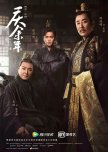
Far from being the best-looking actor, Zhang Ruo Yun has enough comedic chops and charisma to be the leading man Fan Xian. Now Fan Xian is extremely smart but he is no Gary Stu. He makes mistakes and is not afraid to look silly. He has no real drive and ambition but makes up for it with curiosity and candor. He’s also shamelessly modern. I like watching him throw other characters off balance with his modern attitude and sensibilities. This is a satire of those stuffy historical dramas, much in the same vein as TVB’s “A Step into the Past,” only more sophisticated.
Chen Dao Ming (my reason for picking up this show) does not disappoint. As the Qing emperor, he looks very humbled and more like a hermit than a ruler. Underneath all that is a shrewd and predatory man, a praying mantis lying in wait to strike its victims. That said, he’s still not the scariest guy in the series. The crown prince, played by Zhang Hao Wei, is a psycho with a pretty boy’s face. Wu Gang as Chen Ping Ping is unsettling in the best possible way. He reminds me of another genius actor, Christopher Walken.
Calvin Yu as Shen Zhong is the real star of the second half of the series. He’s cunning, cruel, and always ready to maim and kill at the drop of a hat. He’s also selfless and patriotic. If told from a different point of view, this complex man would be the hero of the story, not a villain.
If you ever get tired of all the politics, watch for the Fan family. They bring a lot of lightness, warmth, and humor to the show. Underneath their petty squabbles and dysfunctions, there is a love and support that many of us can relate to. The actors here carry themselves well, as do most of the cast. The only thing lacking at times is the emotional punch, especially in the romantic scenes.
The plot has many twists and turns, so much that it tied itself into knots. I don’t know if the writers can undo those knots in a realistic, believable way. We will see. I patiently await the sequels.
Esta resenha foi útil para você?
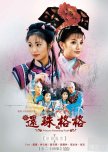
This series needs no introduction. It’s internationally famous and a cultural phenomenon. It set the tone for a whole generation. To watch or not to watch, that is not the question. Rather than being a review, this is a look back at what makes Huan Zhu Ge Ge so special to so many.
The theme is that family is more than just blood relations. Sworn sisters Xiao Yan Zi and Zi Wei showed us that. Zi Wei was willing to give up her father and her royal status to protect Xiao Yan Zi. Xiao Yan Wei was willing to give up her life so that Zi Wei can be with the man she loved. These two were sismance before sismance was even a word. Vicky Zhao and Ruby Lin have the kind of easiness only real-life friends could have, despite the rumors otherwise. Their closeness was not faked, simply because I don’t think Ruby was that deep of an actress. The director was smart enough let it play out naturally (he even kept the scene where Ruby gave Vicky an adorable peck on the cheek).
This show would not be what it is without Zhang Tie Lin’s multi-layered portrayal of emperor Qian Long. His love for both of his daughters was obvious, although it was tinged with guilt, regret, exasperation, and even a little bit of pride/egoism. The highlight of the series was his confused feelings towards Zi Wei, who he was drawn to but didn’t realize was his real daughter. The tension was so thick in those scenes you could cut it with a knife. It was daring on a level you don’t see in most Asian dramas.
A great thing about the writing was that Xiao Yan Zi and Zi Wei weren’t always helpless and dependent on the men. Zi Wei may be frail but was courageous when it counted. Xiao Yan Zi was ill-educated but had a lot of street smarts and common sense. It was her quick thinking that saved everyone in the end.
Famed writer Qiong Yao was never able to replicate the success of this show. I think it’s partly because she didn’t really understand what made the show resonate with viewers. It was not just because of the romance. Yes, the romance here was very beautifully done. The key was not to overdo it and not let it overshadow the main plot. The relationship between Zi Wei and Er Kang moved the plot forward instead of dragging it out. Xiao Yan Zi and Yong Qi’s love was forbidden and restrained enough to leave you wanting more.
As wonderful as this show is, it sets the industry back for about a decade. It made people think that good acting was opening your eyes really, really wide and looking as cute as possible. Every other actress wanted to be the next Xiao Yan Zi.
Esta resenha foi útil para você?
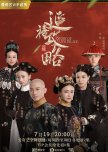
Esta resenha pode conter spoilers
I have this weird love-hate with this series. Despite its flaws, it’s still one of the better palace intrigue stories out there. So I put it on my “guilty pleasure list” and endure the bad for the sake of the good. To start with the good, this has all the elements of the addictive story. You see many nasty palace denizens plotting against our heroine, Wei Yingluo. Just when you think Yingluo is trapped, she turns the table on her enemies and knocks them down ten notches. It’s very gratifying to watch, especially when it cycles along at a steady pace, using a formula that feeds into the addiction center of our brains.
The near fatal flaw with this series is its absurdity. Case in point, Yingluo exacts revenge on a consort by throwing molten iron on her. Someone else adds fecal water to the iron so it will infect her wounds, ensuring to a slow and painful death. Since bacteria could not possibly survive in molten metal (a thousand plus degrees temperature here), the entire scheme is ridiculous. Equally ridiculous is the lighting rod scheme that struck the right person at exactly the right time. These are the kind of things that defy logic and insult the viewers’ intelligence. But we can still enjoy the show, as long as we accept it for what it is: mindless entertainment.
Years from now, people will still remember the show for its costumes. The muted color palette is very pleasing to the eyes. The traditional kingfisher feathers, velvet flowers, and the embroideries are beyond beautiful. The designers create a very distinctive look and authentic feel that sets this far apart from any other Qing era series. The set pieces are luxurious, too, although some of the rooms look sterile and not lived-in.
Notable performances are from Qin Lan and Charmaine Sheh. Qin Lan has depth as the gentle, virtuous empress who is actually broken on the inside. Charmaine is a master at facial expressions and the slightest shift in her smile alone can convey so many different emotions. Her Xian Fei is technically the main villain, but she is extremely sympathetic. I find myself rooting for her half the time, simply because life is cruel to her and she has to be cruel to survive.
The weakest link here is our leading lady, Wu Jinyan. She is given an interesting character, one that is clever and loyal, but with a ruthless streak. She comes across as this reckless girl who shows an attitude to her masters and pushes the boundaries of rules and etiquettes. In the strict Forbidden Palace, this attitude would get her killed a thousand times over. I have a hard time believing she’s that lucky or smart enough get away with it every time. Wu herself doesn’t have much range or subtlety to her acting. When she tries to act playful, it comes off as stilted. Worse, she has “dead fish eyes,” eyes that are large but mostly expressionless. However, she does look unique in period clothing and seems to have potential. Charmaine was awful in her first series, too, and look how far she came now.
The men’s acting are fine, nothing memorable in a story dominated by women. Fu Heng is your stereotypical second male lead who loves our heroine devotedly and unconditionally, as if there are no other good woman in the world. I’m glad they didn’t make Qian Long a jerk or a fool easily manipulated by his wives.
So after watching so many women fighting over one guy, we have to ask: which of his wives does Qian Long really love? No one, I suppose. As Qian Long himself said, his father trained him to be good ruler, and a good ruler cannot rule with his heart. He was raised not to care much about any woman. That’s why he greatly favors Yingluo, because she is the only wife who does not demand his love. She puts no pressure on him and does her best to amuse him. She asks only for gifts and favors - things at are easy for him to give. Does that cheapen their relationship? No, because there is real affection there. For Yingluo, the emperor represents the practical, while Fu Heng represents the ideal. You can marry a Qian Long, but good luck finding a Fu Heng in real life. That man only exists in dreams.
Esta resenha foi útil para você?

The Voidwalkers carry most of the comedy here. Special mentions to Chen Mu Zhi, who has the most priceless of expressions, and Cao Bo as the best sidekick ever. Yuan Ran as Consort Xue is delightful as a mother who is sly yet supportive. It’s hilarious to watch these guys run around trying to outmaneuver each other and manipulate the poor, oblivious Qing Kui. Their generally attitude is “yeah, Kui is a naïve and dumb princess, but she’s *our* naïve and dumb princess.” The Void itself feels more real than our Mortal realm with so many rich details woven seamlessly into the dialogues and subplot. They also get the best costumes: dark, form-fitting, and downright sexy, especially the palace maid outfits. And it doesn’t hurt that the Void men have great physique (yes, the Void King rules in more ways than one).
By comparison, Heaven and Mortal realms are bland. Maybe it’s the cast, maybe it’s the direction, or maybe it’s a little bit of both. Ye Tan and Xuan Shang are ok as our Heavenly lead couple. Their chemistry is like a flickering light, sometimes it’s there, a lot of times it’s not. Their best moments are when he is in his La Mu form. Their worst moments come when they try to be funny and cute. While Landy Li and Chen Xing Xu are capable dramatic actors, they are not comic actors by nature and it shows. Chen Xing Xu’s dubbed voice is much too deep and detracts from his performance.
Watch this for the Void realm and its deliciously cheeky denizens. Watch this for Qing Kui and Zhao Feng's bad boy and naïve girl romance. Watch it for the great looking cast. Most of all, watch it with your FF button close at hand.
Esta resenha foi útil para você?
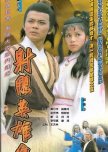
Jin Yong was not Gu Long. His writing was less about the individual psychology and more about the many facets of society and people. Jin Yong adaptations should always have a great ensemble cast and cast chemistry. The director was smart enough to understand that and didn't shortchange the supporting cast in favor of making the leads shine. Felix Wong and Barbara Yung were excellent, but even when they're not on screen the other actors still held my interest.
There were many memorable performances here, but my favorite had to be Kenneth Tsang as Wong Yeuk Si. The man was a wuxia rockstar. He walked in on Wong Yung throwing a tantrum. He didn't try to comfort her, he didn't even ask. He just helped her smash the room to pieces. And when they were done, they just looked at each other and laughed like mad. No words were needed. That scene alone showed you all you need to know about this epic father-daughter relationship. It was a great example of show-and-not-tell in film making, and there were many little gems like it throughout the series.
There's a lot to appreciate about an older series like this one. It didn't coast on pretty costumes, elaborate sets, and CGIs. It focused more on moving the plot and the characters forward. The fight scenes were short but effective (don't miss out on the Kwok Jing vs. Yeung Hong duel). It's refreshing to watch compared to the drawn out wirefu scenes these days.
Esta resenha foi útil para você?

Ren Jia Lun’s strength is that he can act with his eyes. You can literally map his Lu Yi’s growing feelings for Jin Xia through how his eyes for her changes over time. He has this gaze that is just for her and her only. Since Lu Yi is rather cold and inscrutable, Ren Jia Lun needs to convey just enough emotion without being too obvious. He does exactly that and so much more with his nuanced performance. You can see how love gradually changes Lu Yi from a ruthless man who is just doing his job to a man who wants to do the right thing.
Tan Song Yun is cute as a button. The squeaky dubbing and wide-eyed acting work against her at first, but she eventually settles into her role as the greedy, gluttonous, sharp-witted Jin Xia. She matches Ren Jia Lun glance for glance, gaze for gaze. She does comedy well and has me laughing so hard every time Jin Xia pulls some stunts that grate on Lu Yi’s nerves. Unlike Lu Yi who undergoes character growth, Jin Xia remains her kind-hearted, heroic self even through the worst of times. That’s not a bad thing, as she is the moral anchor in their relationship.
Romance aside, we get to see one of the most twisted, sickest villains in Yan Shi Fan, played by the versatile Han Dong. Though Yan is somewhat human in his tenderness towards Lin Ling, he is a beast to almost everyone else. I like watching the interplay between him and Lu Yi, with each trying to read and outmaneuver the other. Very often writers would downplay the bad guy to make our hero look good; thankfully that doesn’t happen here. Yan is a true threat with a clear advantage over Lu Yi in terms of experience and influence in court. Even though Lu Yi smartly avoids his traps, it ultimately takes a group effort to end the stalemate and bring him to justice. It’s fitting that Yan’s own arrogance plays a part in his downfall.
The series generally does a good job in fleshing out the characters, their personalities and motivations. While the plotting isn't perfect, it manages to avoid many of the pitfalls. It doesn’t dumb down our couple or throw any stupid misunderstanding in their way. There are no OOC moments. Without giving away spoilers, I will say that the ending is one of my all-time favorites. It’s serene and simple, but effective in capturing the essence of Jin Xia and Lu Yi’s love. Theirs is a love story I will remember for a very long while.
The only thing that keeps this drama from being a nice round 9.0 was the secondary couple's romance. It drags the story down and forces me to use my FF button.
Esta resenha foi útil para você?







